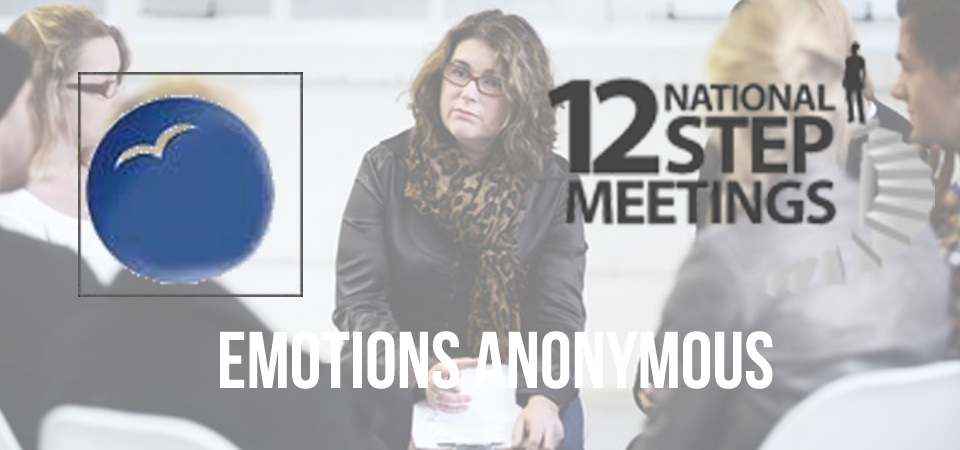
Emotions Anonymous (EA) is a twelve-step program for recovery from mental and emotional illness. As of 2004 there were approximately 1,100 EA groups active in the United States.
National 12 step meetings and Anonymous Groups is a growing repository of meeting data for all well-known established 12 step groups. From coast-to-coast in the USA, this is a growing and free resource to update meetings for all anonymous 12 step groups. The purpose is simple. Provide necessary logistics via maps, precisely the location of a community of people seeking recovery in a private setting. Often times, there isn’t one resource that compiles the meeting locations for all groups, thereby making attendance quite difficult and threatening to one’s recovery. We hope that with your participation, we collectively are able to achieve this goal. 12 Step National Meetings is operated by Sober Group LLC, whose focus, passion, and reason for being resides in our commitment to help addiction treatment and sober living entities grow and thrive in the digital world. Our job is to create relevant and lasting connections between treatment professionals and the clients who seek them.Emotions Anonymous (EA) is a 12-step program aiming to give support and rehabilitation for those afflicted with emotional issues such as anxiety, despair, and rage. Based on the principles of Alcoholics Anonymous (AA) and other 12-step programs, the program stresses personal responsibility, honesty, and humility.
EA offers a secure and supportive atmosphere in which people may discuss their experiences, emotions, and aspirations as they work towards emotional healing and recovery. The program is meant to be inclusive and non-judgmental, and is available to persons of all ages and from all walks of life.
The 12 stages of EA are similar to those of other 12-step programs, but they are customized to the requirements of persons coping with emotional issues. Individuals are encouraged to take responsibility for their own emotional health, cultivate meaningful connections with others, and create healthy coping methods to regulate their emotions.
The first phase of EA is to acknowledge helplessness over emotional challenges. This phase enables people to recognize their inability to regulate their emotions and their need for assistance in managing them. The second step is acknowledging the need for a higher power in the healing process, and the third step is deciding to surrender one’s life to this force.
The fourth phase entails doing a moral inventory of oneself, analyzing one’s behavior patterns and attitudes, and recognizing any negative tendencies that may be leading to emotional problems. The fifth step is to acknowledge one’s shortcomings to oneself, a higher power, and another person. This stage is intended to assist people in letting go of shame and guilt and beginning the healing process.
The sixth stage is preparing to have these flaws eliminated, while the seventh step entails respectfully requesting that the higher authority remove them. Making a list of all those who have been damaged by emotional troubles and being willing to make apologies to them is the eighth stage. The ninth step is to make direct reparations whenever feasible, unless doing so will do oneself or others damage.
The eleventh stage is continuing to conduct personal inventory and acknowledging faults without delay. The eleventh step is attempting to strengthen one’s conscious connection with a higher power via prayer, meditation, or other spiritual activities. The twelfth and final phase is spreading the EA message to those who may be experiencing emotional challenges and using these concepts in all aspects of life.
EA also stresses the need of finding a sponsor, or a more experienced member who can provide direction and support during the recovery process. As people move through the 12 stages, sponsors may give practical counsel, share their own experiences, and provide accountability.
EA is distinguished by its emphasis on emotions and feelings. Those who may be battling with anxiety, sadness, or anger are provided with tools and assistance, and are encouraged to recognize and express their emotions in a healthy manner. EA also offers skills and strategies for emotion management and the development of healthy coping mechanisms.
EA stresses the significance of community development and connection among its members. Individuals are encouraged to attend frequent gatherings where they may share their experiences and provide one another support. EA also offers information and assistance to persons who may struggle to comprehend and manage their emotions.
EA is not meant to replace conventional medical or psychiatric care, but rather to supplement it. Individuals are encouraged to engage with a medical or psychiatric expert as required and to seek further help outside of the group.

